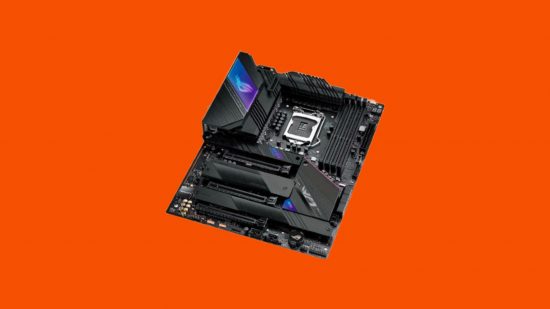Our Verdict
The ROG Strix Z590-E Gaming WiFi is beautiful, loaded with features and it offers better value than the MSI MEG Z590 Ace. It’s clear there’s still some fine-tuning to be done in the weeks before the official Z590 launch, but they’re minor and if we had around $300 to spend, this is the board we’d buy.
- Good M.2 and VRM cooling
- Dual PCI-E 4 M.2 and 16x PCI-E slots
- M.2 latches make installation easy
- M.2 heatsink blocks GPU release latch
- Average audio performance
- No Thunderbolt 4 Type-C port
There’s plenty to drool over with the Asus ROG Strix Z590-E Gaming WiFi motherboard, which is just as well considering it costs $300 (£340). During hands-on testing, one of the standout highlights was its M.2 SSD support.
Two slots support PCI-E 4 SSDs and an additional two slots support PCI-E 3 SSDs, with one also offering a home to SATA M.2 SSDs. They all feature a simple tool-free latch-securing mechanism that takes seconds to install an SSD.
Why you can trust our advice ✔ At PCGamesN, our experts spend hours testing hardware and reviewing games and VPNs. We share honest, unbiased opinions to help you buy the best. Find out how we test.
All four are covered by large heatsinks and the primary slot not only includes a snazzy RGB-illuminated logo but has a thermal pad that cools the underside of M.2 SSDs as well. This resulted in the lowest M.2 SSD load temperature on test at just 55°C.
However, the heatsink sat so close to our backplate-fitted graphics card that we couldn’t access the release catch without a screwdriver, so we’ve docked a couple of points from Asus here. You can run two GPUs in PCI-E 4 mode thanks to two slots supporting this faster standard rather than just one, although you’re still limited to eight PCI-E lanes apiece.
The rest of the board is beautiful, with an illuminated ROG logo and acrylic strip on the I/O shroud and an all-black design that’s mostly color-neutral. You don’t get the full complement of on-board overclocking and testing tools, but there is a clear-CMOS button, LED POST code display, and a USB BIOS FlashBack button.
Both air and water-cooled systems will benefit from its feature set too, with eight 4-pin fan headers and a thermal sensor, so you can control fans based on coolant temperature. Despite the price tag, there’s no Type-C Thunderbolt port – only a header as with most of the other boards.
Meanwhile, the VRM heatsinks are huge and linked with a heat pipe, plus there’s an optional fan you can attach for extra cooling. However, the latter isn’t needed, seeing as the highest temperature we saw during our stress test was 59°C. This board also has display outputs, so if you end up without a graphics card, you can at least use your PC.
You also get a pair of 2.5 Gigabit Ethernet ports and 802.11ax Wi-Fi and Asus has added Realtek’s ALC4080 audio codec. The audio performance was a little disappointing, but this could be down to the early software and drivers we used.
The ROG Strix Z590-E Gaming WiFi hit the top RealBench system scored at stock speed in our test, and had the highest Cinebench single-threaded score too, without topping the power consumption graph.
Overclocking wasn’t as slick as the MSI boards, though, requiring a lot more tweaking and Asus’ AI Suite Software was a little hit or miss as to whether it applied the set vcore or not. However, in the end, we managed a 5.1GHz all-core clock with 1.34V, again achieving the highest system score. It’s one of the best gaming motherboards around $300.
